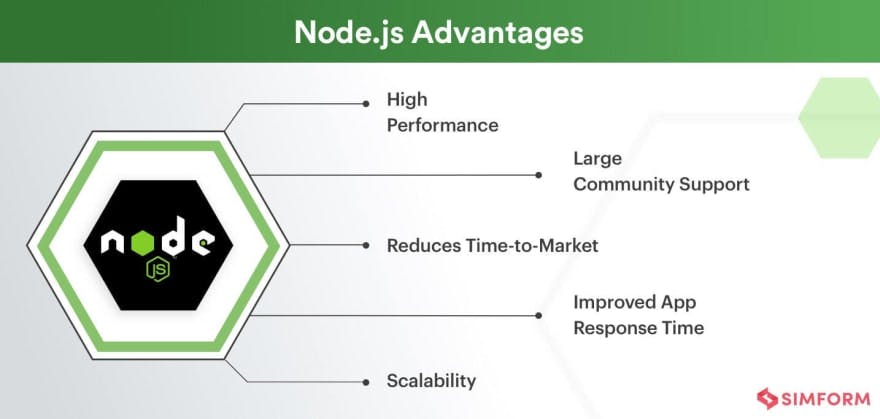5 Node.js Advantages to keep in mind while building your next Web App
The impact of a sluggish and unresponsive application can bring a business down to bits and pieces. However, Node.js has been a knight in shining armor, helping modern web-based enterprises achieve scale, speed, and many other advantages which node.js offers. Wonder why Node.js is the first choice for developing web apps? If yes, then let’s dive in and explore Node.js advantages at length.

Node.js offers High-performance for Real-time Applications
With Node.js, you can build supercharged applications that display results in the blink of an eye. Web applications powered by Node.js benefit massively from its ability to multitask. Unlike other platforms, its single-threaded, event-driven architecture processes multiple concurrent requests efficiently without clogging the RAM. Moreover, its event-loop and non-blocking I/O operations allow code execution at a pace which significantly impacts the application’s overall performance.
What fuels Node.js with this superpower is that it’s built on Google Chrome’s V8 engine and written in C++. It breaks Javascript functions into machine codes with high efficiency and speed. Why this matters is because Google invests heavily in its engine to improve performance, security, and provide excellent support for modern JavaScript features. This directly impacts V8’s performance and, eventually, Node.js. To ensure continuous advancements, Google has introduced the V8 benchmark suite to elevate Node.js’ performance with faster execution, better compilers, security patchworks, and ability to scale.
Node.js offers Easy Scalability for Modern Applications
The cutting-edge technology comes with tons of features like the cluster module. It facilitates load balancing over multiple CPU cores, making it easy to deliver desired outcomes through smaller modules without burning out the RAM process. Additionally, Node.js employs a non-blocking event-loop mechanism that offers high scalability and enables the server to process requests seamlessly.
From the development standpoint, Node.js allows you to leverage Microservices that further lets you segregate your application into smaller parts. This way, you get to define tasks and allocate them efficiently among different teams to fast-track development, deployment, and maintenance of each division of your application. Node.js and Microservic allow modern applications to scale up and down as per need and help companies achieve high performance with fewer resources.
Node.js offers Community Support to Simplify Development
With millions of developers contributing actively to the Node.js community, you can expect extensive support from development experts across the globe to solve even the most peculiar development problems.
NPM, a package manager for JavaScript, is the biggest package manager registry in the world. It offers numerous tools and libraries available readily for you to use in your project. You’ll also find a large pool of resources – ready-to-use solutions, codes, modules, libraries, and registries – on GitHub built by developers to help you achieve more with limited resources.
Node.js improves App Response Time and Boosts Performance
Did you know when Netflix switched from Java and Javascript to Node.js, they hit the jackpot by dramatically reducing their start-up time from 40 minutes to under 60 seconds?
BAM! That’s something, ain’t it?
Well, it’s a given that a constant too and fro of requests has a significant impact on an app’s response time and performance, mostly a negative one if your tech stack is not equipped to handle the load of requests. Here where Node.js, with its single-threaded event-loop model, offers a non-blocking asynchronous architecture without creating more threads by employing fewer resources. This helps boost the responsiveness of your application since it can deal with multiple concurrent users simultaneously.
Node.js reduces Time-to-Market of your applications
Time is priceless to any development team, especially when time-to-market is one of the essential benchmarks of quality and performance for many. Since Node.js is lightweight, it enables developers to accelerate the overall development speed. What’s more, your team gets to use a ton of libraries, ready-to-use codes, and other resources from GitHub, which, in turn, saves a lot of coding time and effort.
Node.js also offers client-side and server-side in Javascript, making it easier and faster to manage code and data files than other similar technologies. In addition to this, its deployments assist you in receiving feedback from the production environment to execution, which also contributes to shortening your application’s time-to-market.
Wrap up
Today’s businesses demand fast, efficient, and highly scalable web apps, which are as much real-time as it can be as the most fitting solutions to meet all your business requirements. With all the advantages covered in this blog, Node.js can fit right in with your project requirements putting your mind at ease.